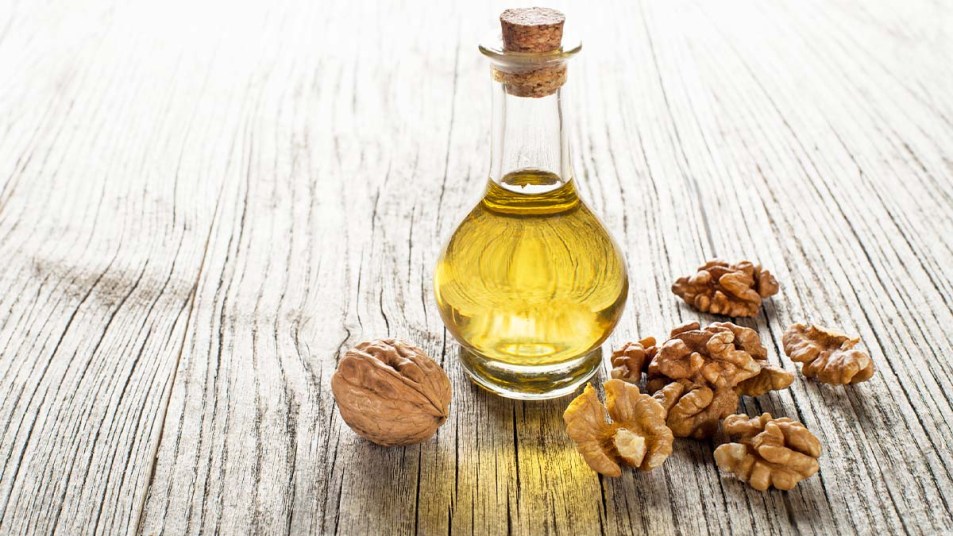Using This Instead of Your Usual Cooking Oil Will Give Your Dishes a Flavor Boost
Plus, it's great for your health!

Shopping for cooking oil is always an adventure for me. I love browsing all the different delicious-sounding varieties — avocado, coconut, even butternut squash seed! — and then usually end up buying my usual extra virgin olive oil (EVOO) or vegetable oil. But while those old standbys will probably always be my go-to oils, I recently discovered a healthy, flavorful option I’d never considered before: walnut oil!
You might be wondering, how is an everyday snack like walnuts turned into oil? According to the experts at Fine Cooking, whole walnuts are shelled and crushed into a thick paste, which then goes through a filtering process that separates out the nut solids. The result is a richly-flavored oil that really shines when used in something like homemade salad dressing, or as a finishing drizzle over pasta or rice. For cooking, it’s great with foods that could benefit from a nutty kick, like sautéed mushrooms and roasted asparagus.
Walnut oil doesn’t just taste amazing though — it’s got a slew of health benefits!
What is walnut oil good for?
Whole walnuts are great for weight loss, lowering your risk of heart disease, and warding off dementia. And the good news is, you won’t miss out on the nutritional advantages of walnuts by using them in oil form.
A study published in Food Science Nutrition looked at the positive effects of consuming walnut oil to reduce intestinal inflammation. Researchers gave mice a 2.5 ml kg dose of walnut oil every day for four weeks. By the end of the study period, they found that the oil eased inflammation by increasing the antioxidant enzymes in the intestinal tissue.
Making this oil a staple part of your diet can also help with blood sugar control. Research published in the International Journal of Endocrinology wanted to see how daily consumption of walnut oil could improve blood sugar levels in patients with type 2 diabetes. Participants took 15 grams a day for a three month period. The study’s authors found that the oil’s poly-unsaturated fatty acids had an anti-diabetic effect to reduce insulin resistance, which is a key factor in high blood sugar levels.
With all those health benefits, you might be wondering (as I was) whether you can use walnut oil in place of your usual EVOO. Read on to find out how walnut oil measures up!
Which is better: Walnut oil or olive oil?
Nutrition expert Alice H. Lichtenstein, DSc, says that while walnut oil is low in saturated fat and rich in the omega-3 fatty acid known as alpha-linolenic acid (good news for your heart health!), this doesn’t necessarily make it better than olive oil. “There’s no unique fatty-acid composition that would make it better than some of the more common vegetable oils,” she told Consumer Reports.
Calorie-wise, a tablespoon of walnut oil contains about 120 calories. Olive oil clocks in at approximately 119 calories per tablespoon — almost exactly the same. But even though the oils closely resemble each other in terms of nutritional benefits, walnut oil has the edge if you’re looking for a flavor-packed oil to experiment with in the kitchen.
Walnut oil is readily available to buy in stores and online. Just be sure to choose a cold-pressed walnut oil brand, like PÖDÖR Premium Walnut Oil (Buy from Walmart, $17.25). Cold-pressing allows for the solids and natural oils from the walnuts to be extracted without using heat, which could damage the oil’s flavor profile and nutritional value.

PÖDÖR Premium Walnut Oil
- Description
- Pros
Happy customer: “This oil is excellent tasting and smelling. It’s great in raw veggie juices or sautéed veggies. Clean tasting, not rancid and very light. Good job!“
- Cold-pressed without any GMOs, preservatives, additives, or colorings
- Has an intense walnut flavor
- Versatile for drizzling over salads, pasta, and steamed vegetables
Next time you’re at the grocery store, try picking up a bottle of walnut oil to add a flavor and health boost to any dish — I know I’m going to!
For an update on why you should avoid canola oil, check out this story from our sister site The Rumor About Canola Oil Being Banned in Europe Has A Grain Of Truth.
This article was updated on Tuesday, August 9 at 12:30 pm EST. It was originally published on December 8, 2021.












